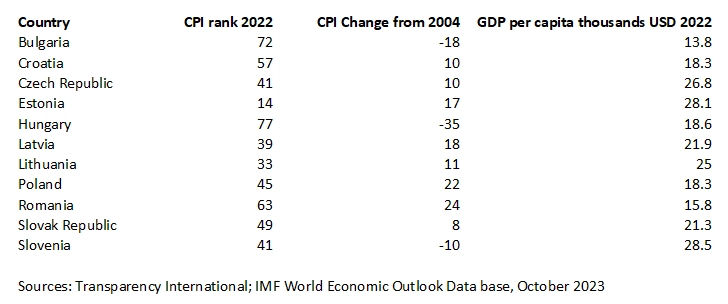People tend to take corruption in a country as something given, claiming that certain countries are corrupt, but others are not. It is true that corruption varies greatly and it tends to be lasting. The four Nordic countries are always ranked among the least corrupt in the world, while authoritarian kleptocracies in Africa, the Middle East and Central Asia are among the worst. Ukraine has long suffered from serious corruption, but the situation can improve with EU accession.
For any traveler in Eastern Europe, it is obvious that corruption has changed greatly. The developments vary by country. The most obvious improvements are noticeable in Poland and the Baltic countries, while Hungary is just getting worse. The best indicator of corruption is the Corruption Perception Index that the authoritative non-governmental organization Transparency International compiles annually for 180 countries in the world.
JOIN US ON TELEGRAM
Follow our coverage of the war on the @Kyivpost_official.
EU accession has had a major positive impact on governance in the eleven formerly communist countries that have become members since 2014. Eight out of these eleven countries have seen substantial improvement in their governance, while three (Hungary, Bulgaria, and Slovenia) have experienced deterioration. The changes are tangible.

Ukraine’s Kyivstar Is Planning IPO on NASDAQ With Help From VEON
Estonia is the true star performer. In 2004, Transparency International already ranked it well as no. 31, and in 2022 it had risen to no. 14, less corrupt than half of the old EU members. Lithuania has surged to no. 33 and Latvia to no. 39. These three Baltic countries are now the formerly communist countries with the least corruption. They are also the countries that carried out the most radical economic reforms in the early 1990s, and they utilized their EU accession to deepen and consolidate their reforms.
The two countries that have improved the most, however, are Romania and Poland. In the 1980s, Poland was considered utterly corrupt, but it carried out as radical reforms as the Balts in the early 1990s, and the positive impact on governance was similar. Just like the Balts, the Poles used EU accession to improve their governance. Even the last eight years of unhelpful nationalist rule has not succeeded in breaking its EU standards.
Romania has been a laggard in market reforms, but even so it rose 24 steps from no. 87 in 2004 to no. 63 in 2022, showing that the independent anticorruption prosecutor who brought to justice more than one thousand top officials had changed its governance. The anticorruption prosecutor could be effective despite massive opposition from the old communist elite thanks to strong EU pressure. The lesson from Romania is that late judicial reform is possible, but it requires strong support from the EU. This is an important lesson for Ukraine, and for the EU on how to handle Ukraine.
After these five stellar successes come three moderate successes: Czechia (ranked no. 41 in 2022, +10 from 20004), Slovakia (no. 49, +8), and Croatia (no. 57, +10). All these countries have pursued decent policies, and Croatia has improved greatly in recent years.
The three laggards – Hungary, Bulgaria and Slovenia – are also interesting. At the end of communism, Slovenia was by far the most developed post-communist countries followed by Hungary. Their comparatively fortuitous situation rendered both countries not very reformist. Slovenia stands out by having pursued the least privatization of all post-communist countries. Eventually, its reluctance to do anything to improve governance took its toll.
Hungary is the most interesting case. No EU country has seen such a fast deterioration of governance.
In 2004, Hungary had the third best governance among post-communist countries after Slovenia and Estonia (ranked no. 42), but now it has the very worst governance of these eleven countries, plummeting 35 steps to no. 77. The obvious explanation is that since he became Prime Minister in 2020 Viktor Orbán has done his utmost to undermine Hungary’s governance and redirect funds to himself and his cronies.
Bulgaria is a simple and sad story. In spite of numerous attempts of decent reformers, the government has never been strong enough to break the old communist organized crime gangs. The EU appears to understand the situation well, but it needs to try harder to help the good forces in Bulgaria to defeat the old communist criminals.
Good governance is no objective in itself. It matters because it leads to economic well-being. In 2022, Estonia reached almost the same GDP per capita as Slovenia ($28,000), whereas in 1995 Slovenia’s GDP per capita was four times as high as Estonia’s.
The three rising stars are the Baltic countries – Estonia, Lithuania and Latvia – which are all much better off than semi-authoritarian Hungary, which is the big loser also in economic welfare.
Bulgaria remains the poorest EU country, even poorer than Russia. Bad governance to the benefit of corrupt rulers is very costly to the people.
What does this mean for Ukraine? EU accession offers a great opportunity to improve governance, but it is no guarantee. It is a means to support domestic reforms. At present, Ukraine ranks no. 116 on the Corruption Perception Index, but it has improved greatly from no. 142 in 2014, and its reforms in the last two years portend a further rise. The Baltic states, Poland, and Romania offer Ukraine the most relevant examples of what works and should be done.
Anders Åslund is the author of “Russia’s Crony Capitalism: The Path from Market Economy to Kleptocracy”.
The views expressed are the author’s and not necessarily of Kyiv Post.
You can also highlight the text and press Ctrl + Enter











